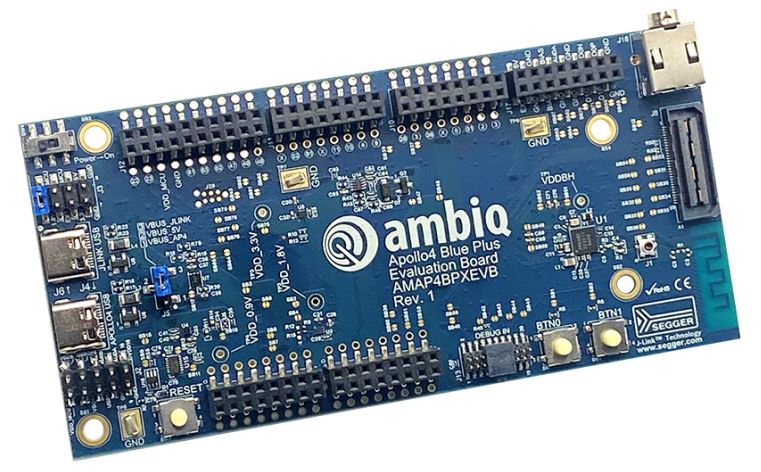Ambiq Apollo4 Blue Plus KXR EVB
Apollo4 Blue Plus KXR EVB is a board by Ambiq featuring their ultra-low power Apollo4 Blue Plus SoC.

Hardware
Apollo4 Blue Plus SoC with upto 192 MHz operating frequency
ARM® Cortex® M4F core
64 kB 2-way Associative/Direct-Mapped Cache per core
Up to 2 MB of non-volatile memory (NVM) for code/data
Up to 2.75 MB of low leakage / low power RAM for code/data
384 kB Tightly Coupled RAM
384 kB Extended RAM
Bluetooth 5.1 Low Energy
For more information about the Apollo4 Blue Plus SoC and Apollo4 Blue Plus KXR EVB board:
Supported Features
The Apollo4 Blue Plus KXR EVB board configuration supports the following hardware features:
Interface |
Controller |
Driver/Component |
|---|---|---|
MPU |
on-chip |
memory protection unit |
NVIC |
on-chip |
nested vector interrupt controller |
SYSTICK |
on-chip |
systick |
STIMER |
on-chip |
stimer |
GPIO |
on-chip |
gpio |
UART |
on-chip |
serial |
WDT |
on-chip |
watchdog |
RADIO |
on-chip |
bluetooth |
The default configuration can be found in the defconfig file:
boards/arm/apollo4p_blue_kxr_evb/apollo4p_blue_kxr_evb_defconfig.
Programming and Debugging
Flashing an application
Connect your device to your host computer using the JLINK USB port. The sample application Hello World is used for this example. Build the Zephyr kernel and application, then flash it to the device:
# From the root of the zephyr repository
west build -b apollo4p_blue_kxr_evb samples/hello_world
west flash
Note
west flash requires SEGGER J-Link software and pylink Python module to be installed on you host computer.
Open a serial terminal (minicom, putty, etc.) with the following settings:
Speed: 115200
Data: 8 bits
Parity: None
Stop bits: 1
Reset the board and you should be able to see on the corresponding Serial Port the following message:
Hello World! apollo4p_blue_kxr_evb
